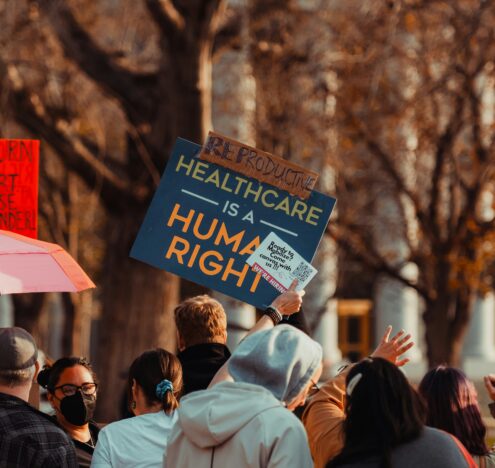When Karelis Sánchez arrived home that October 2021 night in Guayaquil, Ecuador, the coroner was already taking away her father’s body.
She sobbed uncontrollably; she knew someone had targeted him because he worked as a hitman for Los Lagartos, a gang founded in Ecuador’s prisons.
But then a video showed that her own 17-year-old brother had shot him, along with two other members of the rival gang, Los Choneros, which is one of the most prominent in Ecuador.
“What happened to my family was ugly,” 20-year-old Sánchez said. “My brother’s gang told him they’d kill him if they didn’t kill [our father] himself.”
“But they ended up killing [my brother], too. The same gang.”
Sánchez intimately knew this kind of retaliation — at five years old, an enemy of her father shot her, and she nearly died from blood loss. She pointed to the scars where bullets passed through her left cheek and shoulder.
“If God hadn’t given me the will to live, I wouldn’t be telling this story now,” she said. She faced continued death threats from her father’s gang throughout adolescence, especially as she decided to transition to live as a transgender woman.
Fed up, she decided in February to flee the escalating insecurity in her hometown, joining a growing movement of Ecuadorians escaping an explosion of gang violence linked to drug trafficking, extortion, and economic stagnation, many of them with sights on the United States. US border agents have intercepted more than 62,000 Ecuadorians at the Mexico border during the 2024 fiscal year so far, a nearly 300% increase from the same period in 2021.
One of the Most Dangerous Countries in the Americas
“Ecuador has become one of the most dangerous countries in the Americas,” said Guillaume Long, who served as Ecuador’s minister of foreign affairs from 2016 to 2017 under former president Rafael Correa. “Coming from a country which not so long ago was one of the most peaceful … this has meant a huge trauma for Ecuadorians who totally did not expect this.” Ecuador’s murder rate more than tripled in the last two years, reaching 45 deaths per 100,000 residents in 2023.
In Guayaquil, home to a major port, gangs fight over control of the routes to export cocaine destined for Europe and the United States. While Ecuador still is not a producer of the drug, the country has become a key throughway for drugs from Colombia and Peru. Gangs work with outside criminal groups like Mexican cartels and the Albanian mafia.
Experts say a confluence of factors have created a vacuum ripe for organized crime to take hold since 2017: Ecuador’s geographical location, a 2016 peace agreement that demobilized Colombia’s largest armed group, and the neglect of key government structures after former president Correa left office.
“We did have two really bad governments that weakened the institutions even more [after Correa],” said Doménica Ávila-Luna, a researcher and political analyst at King’s College London. “They really didn’t put a structure in place to control or guarantee security for the population.”
The pandemic exposed the weak state structure, Avila explained, when the military shifted to support the supply chain, transporting things like food and medicine. “That left a lot of holes that the narcos took advantage of, and [they] basically grew out of that,” Avila said.
Extortion Common
The pandemic also caused tens of thousands of young Ecuadorians to desert school, a population that is particularly vulnerable to gang recruitment, like Sánchez’s brother. More than 350 kids and teenagers were killed violently in 2023, a more than 80% increase.
Sánchez left Ecuador along with her close friend, Dulce Molina, who closed the small store she owned in Guayaquil because gangs extorted her for weekly fees, or “vacunas.”
“What you’re going to earn, within the week you’re going to pay [to the gangs],” Molina said.
Molina’s daughter, who lives with her mother, has been forced to attend school virtually, and she’s felt scared to walk outside. In February, Molina decided to close the store for good and sell everything she had to pay for the trip to the United States border.
Extortion payments used to be a “legend” from places like Colombia or Mexico, Avila said, but they’ve become common practice in Ecuador in the last two years.
The Journey North
After a nearly two-month journey that she mostly spent walking, Sánchez met up with Molina in the beach town of Necoclí, Colombia. There, the pair braided hair and applied eyelashes until they each had earned the few hundred dollars needed to continue on through the Darien Gap, the lawless 60-mile jungle stretch most migrants must hike through to reach Panama and continue north through Central America.
More than 57,000 Ecuadorians crossed the Darien jungle last year, a 95% increase from the year before.
Ecuadorians could previously fly to Mexico without a visa. But in 2021, the country began requiring visas for travel from Ecuador. Many now decide to migrate by land, first by crossing the Colombian border by bus or cargo truck and then continuing north through the now-popular Darien Gap. Others have flown to Nicaragua or El Salvador to begin the journey.
Ecuador’s security crisis reached a tipping point in January, when masked gunmen took over a public television station during a live broadcast. The leader of Los Choneros also escaped from prison, prompting President Daniel Noboa to declare a state of emergency that is still in effect today. Killings have dropped since, according to the Wilson Center, amid a nationwide curfew and increased military patrols in prisons and violent areas. But other crimes like kidnappings have increased.
Insecurity At Home
The perception of insecurity – and whether it’s temporary or lasting – is a key factor driving emigration, on top of economic woes, Avila said. “I would suspect that if the security crisis is controlled somehow, migration levels would probably reduce,” she said.
Long, who is now a senior fellow at the Center for Economic Policy and Research, said the government must go further. When the state of emergency ends, it is critical that Noboa develops a long-term security strategy and fights corruption within the police and judicial systems.
Fostering a collective dream and identity among Ecuadorians is also key. Without “something which really makes people feel part of a sort of social movement … you’re going to face the encroachment of a failed state,” he said. “That is a recipe for a lot of pain for several countries that have experienced it.”
The latest increase in emigration from Ecuador began mildly in 2019 but spiked in 2021 as the COVID-19 pandemic raged on in the country, according to a report from the nonpartisan Migration Policy Institute. In 2020, graphic images emerged from Ecuador of coronavirus victims’ bodies left in the streets. The pandemic immediately overwhelmed a hospital system that had already suffered from underfunding, said Long. “The state sort of abandoned its primary responsibility … of social care,” said Long. “You had a rise of poverty and inequality before the pandemic. And then the pandemic arrived.”
The country’s economy has since struggled to recover. More than a quarter of people live in poverty, and the number of Ecuadorians working informally has increased to more than 55%. Unemployment averaged 3.7% in the last year with almost no improvement in the last two years. More than 20% of people are underemployed, meaning they earn less than the $460 monthly minimum wage.
A Power Void
As he waited to begin the Darien Gap trek in Necoclí, Colombia, Diego Correa told Inkstick that he got by working as an electrician in Quito, but he decided to leave Ecuador with his teenage son to “make the most” of the “opportunity [the United States] is giving.”
Correa doesn’t particularly like the idea of living in the US, but he knows several friends who’d made it over the border and are now working. Some were turned away at the border, but then they made it over the second time they crossed. “Thank God, they’re working, because they have to,” he said. “That is what they talk about, that [the US] is a country where everything is work.”
Gangs didn’t target Correa, he said, because he doesn’t own a business or have much money. But he no longer felt comfortable going outside at night. “Now people keep themselves at home earlier because it’s unsafe,” he said. “Sometimes crazy people pass by …. People take care of their lives.”
A recent United Nations refugee agency survey found Ecuadorians have “normalized” taking precautions and created “care strategies” to avoid robberies or more serious crimes, like avoiding certain areas or staying home more often.
Looking forward, the international approach to Ecuador must focus on security throughout the entire Andes region, said Beatriz García Nice, an associate with the Wilson Center’s Latin America Program. “It’s not just about Ecuador, it’s about a regional trend that can turn any country in the region very quickly,” she said, referring to additional instability in Colombia and Peru. Nice said “strong support” from the US could come in the form of new trade agreements, for example. “It’s a power void right now.”





















